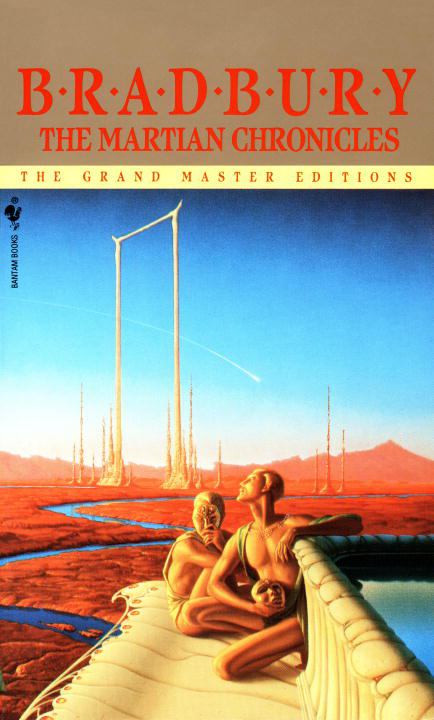- The Good: Short speculative fiction stories about humanity’s exploration of Mars
- The Bad: A chapter on race that is uncomfortable to read with modern eyes, despite Bradbury’s best attempts
- The Literary: A classic unto itself!
A superb collection of chronologically-related short stories about humanity’s repeated attempts to colonize Mars. Several missions and rockets are lost before man finally gets a grip on the red planet. Most men succumb to the Great Loneliness at seeing their planet shrink in space behind them. But once on the surface, the native Martians have their own ideas of who these visitors are and take matters into their own hands.
Bradbury excels at quiet and imaginative scifi. It’s not the kind of scifi that focuses on technology or the science, but the kind that turns a mirror on ourselves and forces us to see humanity. Infused with surrealism, these border on fantasy. The first few stories open up a new world and set up the hope of exploration. There’s wonder and curiosity for the first settlers.
Eventually rockets upon rockets of humans migrate to Mars, with their old traditions and new dreams. And with a touch as light as the Martian atmosphere, you’ll barely notice the darkness creeping in at the edges. As if in a dream, humanity’s efforts are a doomed funeral march toward our own inevitability.
These are definite reflections of the American dream, as settlers invaded the “virgin” land of the Americans, pushing the frontier, their mere presence forever altering the face of the continent. We are drawn to the strange alien beauty of a place, the promise of a new life, but we end up craving comfort, a sense of home, and reshape the very thing we invaded into a monstrosity of what we initially wanted to escape.
The central chapter Usher II stands out in my memory, because of unrelated coincidence of Poe and his The Fall of the House of Usher in my own life. In Bradbury’s story, a wealthy eccentric escapes the bureaucracy of Earth to build something out of fiction. As fiction in all forms has been outlawed on Earth, a man in a suit promptly instructs the eccentric that the house must be destroyed. And so is the way with humanity. We destroy in order to build, only for that which we built to be destroyed.
In addition to colonialism, the stories explores themes of science and telepathy, religion and missionaries, all through personal stories of small lives. I also love the poetic prose, with just a few samples included below—
- “The ship… came from the stars, and the black velocities, and the shining movements, and the silent gulfs of space… It had moved in the midnight waters of space like a pale sea leviathan.”
- “The fire… fed upon Picassos and Matisses… like delicacies, baking off the oily flesh, tenderly crisping the canvases into black shavings.”
- “There was a smell of Time… like dust and clocks and people. And if you wondered what Time sounded like, it sounded like water running in a dark cave and voices crying and dirt dripping down on hollow box-lids, and rain… Time looked like snow dropping silently into a black room… Tonight you could almost touch time.”
You won’t regret picking up this one. Highly recommended for fans of lyrical, clever, and wistful speculative fiction!
